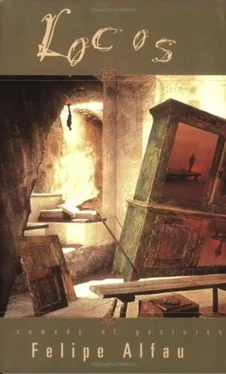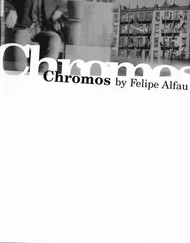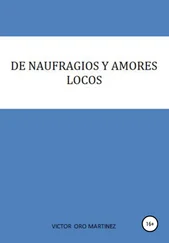Felipe Alfau
Locos: A Comedy of Gestures
This. novel is written in short stories with the purpose of facilitating the task of the reader. In this way the reader does not have to begin the book near a given cover and finish it at a point nearer the opposite cover. Each chapter being a complete story in itself, the reader may pick up this book and begin it at the back and end it at the front, or he may begin it and end it in the middle, depending on his mood. In other words, he can read it in any fashion except, perhaps, upside down.
However, for the benefit of those in whom the habit of reading a book in the usual manner is deeply set and painful to eradicate, the pages have been numbered clearly and the stories arranged less clearly in a conventional order which my friend. Dr. José de los Rios, and myself have found somewhat adequate.
Aside from this superficial arrangement, I am not entirely to blame for committing this novel; the characters used in it being, I believe, far more responsible than myself.
For some time I have been realizing more and more clearly the way which characters have of growing independent, of rebelling against their creator’s will and command, of mocking their author, of toying with him, dragging him through some unsuspected and grotesque path all their own, often entirely contrary to that which the author has planned for them. This tendency is so marked in my characters that it makes my work most difficult and places me in many a predicament.
Such rebellious spirit is shown in these people by a strong desire to become real beings. They often steal into persons I have met and assume the most extraordinary attitudes according to what they think true life is. They assume what in persons is called a pose and has often ended a promising friendship for me. For them reality is what fiction is to real people; they simply love it and make for it against my almost heroic opposition. As one of them says:
“Characters have visions of true life — they dream reality and then they are lost.”
I should add: the author is lost.
And even as I write this prologue, I realize how true this is, for I can find no connection with that individual and official author of this book who once while in the mad, fantastic city of Toledo wandered one day with his friend, Dr. José de los Rios, into the Café de los Locos (the Café of the Crazy) where he witnessed things and saw people which in his playful imagination took the shape of this book, who with the lack of conscience typical of an author advised an acquaintance there to trade his insignificant, though real life in this world for the still less significant and not at all real existence in these pages, who at the end of a chapter flung a window open and let in real life to take the stuffy and fictional life of the one character who was his childhood friend and who in a persistent confabulation with the characters found in that Toledo café, is the abstract, but nevertheless real, perpetrator of this experiment.
The result of this is a bunch of contradictory characters inconsequent as their author and just as clumsy in their performance. As their personality is a passing and unsteady thing that lasts at most a book’s length, they have lost respect for it and change it at will, because they have a faint idea that life is abrupt and unexpected.
Their knowledge of reality is vague and imprecise. Sometimes I have given a character the part of a brother or a son, and in the middle of the action he begins to make love to his sister or his mother, because he has heard that men sometimes make love to women. Another character appears as a child in a situation that takes place when he should be a mature man, because he attributes his persistent failure to understand the situation to immaturity typical of childhood. Again, another character, who has the part of a chicken, begins to bark in the middle of her lines, because she has seen a dog she likes. Time and space do not exist for these people, and that naturally ruins my work completely.
By the end of this book my characters are no longer a tool for my expression, but I am a helpless instrument of their whims and absurd contretemps. As I think of this I turn to the end of this volume where I find myself saying:
“. every limb in me acted regardless of my will. ”
What better example of my helpless condition?
In short, my characters have taken seriously the saying that “truth is stranger than fiction” and I have failed in my attempts to convince them of the contrary.
And now I want to express my gratitude in particular to Dr. José de los Rios for his assiduous cooperation, timely advice, and for having so pertinently contributed with the manuscript of my friend Garcia, entitled Students , and I also want to thank my characters in general for their anarchic collaboration, seldom being disdainfully obedient to my will, often going off on their own track and doing things, I regret to admit, much better than I could have done them.
After this, and considering that the action of this book develops mainly in Spain, a land in which not the thought nor the word, but the action with a meaning — the gesture — has grown into a national specialty, I must beg the reader to expect nothing but that, which in this case, and due to the unreliable nature of the characters and myself, conveys no meaning at all but only empty situations.
As a contrast and a tacit reproach to this most impolite animation of the characters, the reader should exercise a certain amount of composure and under no circumstances show signs of the slightest surprise at whatever takes place. Sometimes the reader will find that an important character appears in a very inadequate dim light and in some cases he may entirely fade away. In other instances an apparently obscure character will assume a decided importance and almost conduct himself with all the resolution of a first-rate hero. Sometimes the threads of the book break suddenly and hang limp from my fingertips upon an abyss of futility; at other times they are joined together, strengthened and then bound about my subdued wrists into some sort of fatal and inevitable finality.
One must bear in mind that these people are creating their own life and standards, and are still novices at the game. In other words, the reader is expected to sit back and watch this procession of strange people and distorted phenomena without even a critical eye. To look for anything else, or to take seriously this bevy of irresponsible puppets and the inconsistency of the author, would not be advisable, as by doing so and imagining things that might lend themselves to misinterpretation, the reader would only disclose, beneath a more or less entertaining comedy of meaningless gestures, the vulgar aspects of a common tragedy.
New York, 1928.
In writing this story, I am fulfilling a promise to my poor friend Fulano.
My friend Fulano was the least important of men and this was the great tragedy of his life. Fulano had come to this world with the undaunted purpose of being famous and he had failed completely, developing into the most obscure person. He had tried all possible plans of acquiring importance, popularity, public acknowledgment, etc., and the world with a grim determination persistently refused to acknowledge even his existence.
It seems that about Fulano’s personality, if we are to grant him a personality, hung a cloud of inattention which withstood his almost heroic assaults to break through it.
Fulano made the utmost efforts to be noticed, and people constantly missed him.
I have seen Fulano shake hands during an introduction in a vehement way, stare violently and shake his face close to the other person’s, literally yelling:
Читать дальше












